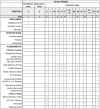Study protocol for cholera vaccination as a model to measure the inflammatory response in the gut: A case of modulation with a Lactobacillus plantarum K8 lysate
- PMID: 36809275
- PMCID: PMC9942990
- DOI: 10.1371/journal.pone.0281817
Study protocol for cholera vaccination as a model to measure the inflammatory response in the gut: A case of modulation with a Lactobacillus plantarum K8 lysate
Abstract
It is crucial for human health that the immune system of the gastrointestinal tract works effectively. Dietary modulation is one of the factors that regulate the immune response in the gut. This study aims to develop a safe human challenge model to study gastrointestinal inflammation and immune function. This study focuses on evaluating gut stimulation induced by the oral cholera vaccine in healthy people. In addition, this paper describes the study design for assessing the efficacy and safety of a probiotic lysate, identifying whether functional ingredients in food can modulate inflammatory response induced by oral cholera vaccine. Forty-six males aged 20 to 50 with healthy bowel habits will be randomly allocated to the placebo or intervention group. Participants will consume 1 capsule of probiotic lysate or placebo twice daily for 6 weeks, take oral cholera vaccines on visit 2 (day 15) and visit 5 (day 29). The level of fecal calprotectin, a marker of gut inflammation, will be the primary outcome. The changes of cholera toxin-specific antibody levels and local/systemic inflammatory responses will be evaluated in blood. The purpose of this study is to evaluate gut stimulation of the oral cholera vaccine and investigate the effect of a probiotic lysate on improving the mild inflammatory response induced by the vaccine or supporting the immune response in healthy subjects. Trial registration: * This trial is registered in the International Clinical Trials Registry Platform of WHO (ICTRP, registration number: KCT0002589).
Copyright: © 2023 Park et al. This is an open access article distributed under the terms of the Creative Commons Attribution License, which permits unrestricted use, distribution, and reproduction in any medium, provided the original author and source are credited.
Conflict of interest statement
The authors have declared that no competing interests exist.
Figures

References
-
- EFSA Panel on Dietetic Products N, Allergies. Guidance on the scientific requirements for health claims related to gut and immune function. EFSA Journal. 2011;9(4):1984.
-
- Calder PC, Ahluwalia N, Albers R, Bosco N, Bourdet-Sicard R, Haller D, et al.. A consideration of biomarkers to be used for evaluation of inflammation in human nutritional studies. British Journal of Nutrition. 2013;109(S1):S1–S34. - PubMed
-
- Ouwehand A, Ten Bruggencate S, Schonewille A, Alhoniemi E, Forssten S, Bovee-Oudenhoven I. Lactobacillus acidophilus supplementation in human subjects and their resistance to enterotoxigenic Escherichia coli infection. British journal of nutrition. 2014;111(3):465–73. doi: 10.1017/S0007114513002547 - DOI - PubMed
-
- Ten Bruggencate S, Girard S, Floris-Vollenbroek E, Bhardwaj R, Tompkins T. The effect of a multi-strain probiotic on the resistance toward Escherichia coli challenge in a randomized, placebo-controlled, double-blind intervention study. European journal of clinical nutrition. 2015;69(3):385–91. doi: 10.1038/ejcn.2014.238 - DOI - PubMed
Publication types
MeSH terms
Substances
LinkOut - more resources
Full Text Sources
Medical
Research Materials

